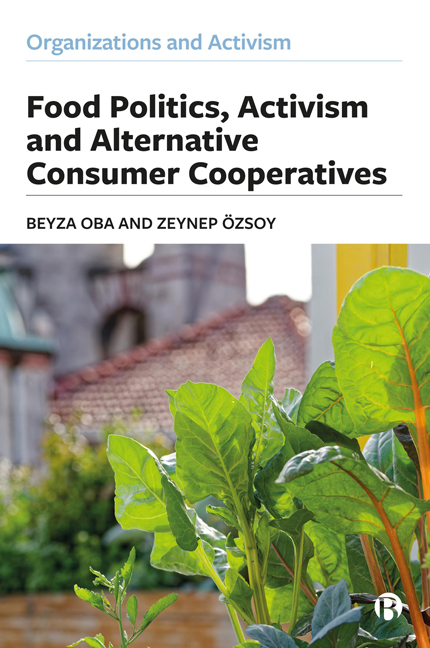Book contents
- Frontmatter
- Contents
- Series Editors’ Preface
- 1 Introduction: Experimenting with Direct Democracy
- 2 The Politics of Food: Alignment for Solidarity and Resistance
- 3 Against Neo-Liberalism and Authoritarianism: The Background to Food Politics in Turkey
- 4 The Political Economy of Consumer Cooperatives in Turkey
- 5 Alternative Consumer Cooperatives in the Making of a Public Sphere
- 6 Experimenting with an Alternative to the Capitalist Food Provisioning System
- 7 The Governance of Alternative Consumer Cooperatives
- 8 Instead of a Conclusion
- Notes
- References
- Index
7 - The Governance of Alternative Consumer Cooperatives
Published online by Cambridge University Press: 27 March 2024
- Frontmatter
- Contents
- Series Editors’ Preface
- 1 Introduction: Experimenting with Direct Democracy
- 2 The Politics of Food: Alignment for Solidarity and Resistance
- 3 Against Neo-Liberalism and Authoritarianism: The Background to Food Politics in Turkey
- 4 The Political Economy of Consumer Cooperatives in Turkey
- 5 Alternative Consumer Cooperatives in the Making of a Public Sphere
- 6 Experimenting with an Alternative to the Capitalist Food Provisioning System
- 7 The Governance of Alternative Consumer Cooperatives
- 8 Instead of a Conclusion
- Notes
- References
- Index
Summary
Introduction
The activists involved in the ACCs are against authoritarianism; they value participation, solidarity and equality. As discussed in Chapter 3, the hegemonic neo-liberal project deliberately excluded some groups (women, the secular middle class and people with a specific political orientation) from economic and social life. As a consequence of the implementation of neo-liberal policies, after 2001 most of the activists became precariat; they deliberately refused the governing principles of investor-owned companies and the managerialism underlying them. Being against authoritarianism, neo-liberal policies and the politically exclusionist attitude of the ruling groups, the activists aimed to develop an alternative governance based on the principles of equality, inclusion and participation.
Experimenting with democratic and dialogic decision-making practices, they decided to get rid of the hierarchical relationship in the newly formed cooperatives. Using a diverse economy approach as a framework (Gibson-Graham 2006; Gibson-Graham et al, 2013) we analysed the work practices of the ACCs that are based on ‘zero-hierarchy’ and ‘consensus-based collective decision-making’. By experimenting with various practices negotiated among their members, activists involved in the ACCs aim to prefigure a post-capitalist society that is just, democratic and egalitarian.
This chapter explains the ‘alternative’ governance model which the ACCs experimented with. In so doing, we examine how various practices of this governance model are developed and how conflicts that arise from this new governance model are handled. The chapter is composed of three parts: performance measures, form of organization and volunteer work.
In search of an alternative governance model
The roots of the ACCs and the prefigurative strand taken by activists can be traced back to the Gezi protests and the underlying values and practices that were developed in the subsequent ‘park forums’ and Occupy houses. Gezi was an occasion where the discontents of the hegemonic neo-liberal project – the white-collar workers, professionals and students, had a chance to experiment with an alternative model shaped by solidarity, direct democracy, participation, mutuality, consensus and cooperation. As stated by a food activist, “Gezi was a ‘call’, where people who were seen as a political, insensitive to societal and ecological issues came together to build a future society that is inclusive, democratic and egalitarian.”
- Type
- Chapter
- Information
- Food Politics, Activism and Alternative Consumer Cooperatives , pp. 125 - 140Publisher: Bristol University PressPrint publication year: 2023

